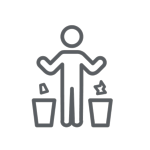REDUCING WASTE
 As part of the ambition to reduce our carbon footprint by 15% in 2023, the UT wants to reduce the amount of waste it produces. To realize this, a waste plan has been written that links all aspects of waste together and ensures that initiatives will enhance each other. It describes the current and desired situation on campus as well as how progress is being monitored and reported. The main goal of the waste plan is to prevent and reduce waste. Where waste does arise, we try to separate it as much as possible to facilitate recycling and what cannot be recycled we dispose of properly, safely and responsibly.
As part of the ambition to reduce our carbon footprint by 15% in 2023, the UT wants to reduce the amount of waste it produces. To realize this, a waste plan has been written that links all aspects of waste together and ensures that initiatives will enhance each other. It describes the current and desired situation on campus as well as how progress is being monitored and reported. The main goal of the waste plan is to prevent and reduce waste. Where waste does arise, we try to separate it as much as possible to facilitate recycling and what cannot be recycled we dispose of properly, safely and responsibly.
PLANNING
Click to zoom in
MORE ABOUT WASTE
WASTE FREE CAMPUS
In 2030, the UT wants to have a waste free campus and in 2050 a circular campus. The definition of a waste free campus is calculated in accordance with the regional goals for a waste-free Twente (Dutch). For the UT this means a reduction of residual waste from 43kg to 10.5kg per person per year. To reach this goal, recycling rates on campus will have to improve. In addition to improving waste separation, the UT also wants to decrease plastic (PMD) waste from 2.8kg to 2.5kg per person per year. Other waste streams should decrease as well. For example by making digitally reading and handing in papers the norm, by extending the lifetime of electronics and by considering waste reduction, prevention and circularity in all new tender processes.
More information about waste separation of the UT for employees and students can be found on the Service Portal.
